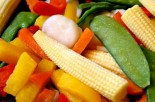The USDA MyPlate recommendations act as a guide for a healthy eating regimen.
But are they realistic?
The nutrition experts will agree that filling half of your plate with fruits and vegetables is a no-brainer for healthy eating. The challenge for many people is this: if it's not fresh and organic, should you eat it?
Research conducted by UC Davis, published in the Journal of Science and Agriculture found that -- contrary to popular belief -- there may be more loss of nutrients in fresh produce, and freezing and canning may actually preserve nutrient value.
Often consumers complain that fresh produce can be too expensive, and in some instances, it may be – especially when purchasing a fruit or vegetable that is not in season in your region. However, it becomes even more costly when it merely rots in the crisper drawer and ends up in the garbage. Packed produce also ensures 100 percent edible parts of the plants – no waste.
"It can be much easier to get people to fill half their plate with fruits and vegetables using canned or frozen produce for many reasons: cost, less plant waste, consistency of taste, already cut, and ease of cooking," says Elizabeth Pivonka, a registered dietitian and President of the Produce for Better Health Foundation.
Felicia Stoler, PhD, joins Melanie Cole, MS, to reassure you that if eating frozen or canned fruits and vegetables is an easier fit for your lifestyle, then you should go for it without feeling guilty.

Food Fight: Fresh vs. Frozen vs. Canned
Guest
: Felicia Stoler, PhD
From the Show: Train Your Body
Summary: When it comes to your daily servings of fruits and veggies, convenience is as important as taste. But is it as healthy?
Air Date: 4/22/14
Duration: 10
Host: Melanie Cole, MS
Tagged under
Απολαύστε την εμπειρία ενός ζωντανού καζίνο με πραγματικούς ντίλερ στο Infinity Casino, προσφέροντας παιχνίδια όπως Live Blackjack και Live Roulette.





